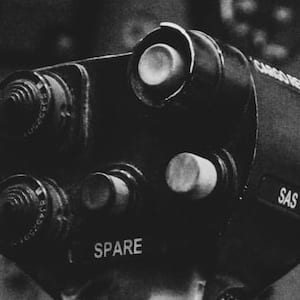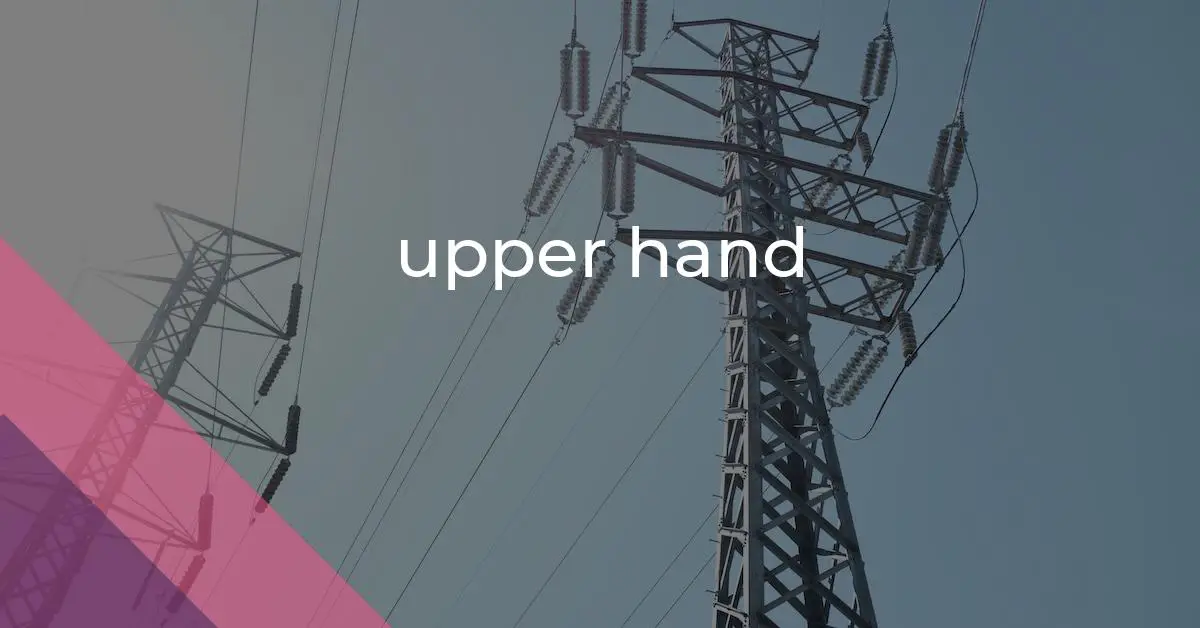upper hand: Idiom Meaning and Origin
What does ‘upper hand’ mean?
The idiom "upper hand" refers to having an advantage or being in control of a situation. It implies having more power, influence, or authority over others.

Idiom Explorer
The idiom "whip hand" means having control or advantage over a situation or person. It refers to being in a position of power or authority.
The idiom "up on" means to be knowledgeable or well-informed about a particular subject or topic.
The idiom "under one's thumb" means to be controlled or dominated by someone, usually in a relationship or a situation where one person has significant influence or power over another.
The idiom "turn the tables" means to reverse a situation or gain an advantage over someone who had previously had the upper hand.
The phrase "top dog" is an idiom that means to be the most powerful or dominant in a particular situation or group. It often refers to someone who is in the highest position of authority or who is consistently the best at something.
The idiom "reign supreme" means to have complete control or be in a position of undisputed power or authority.
'Pull rank' is an idiom that means to use one's higher rank or position of authority to gain an advantage or to assert dominance over someone else.
The idiom "powers that be" refers to the influential individuals or groups who hold authority or control over a particular situation or organization.
The idiom "on top of" means to be in control of a situation or to be aware and knowledgeable about something. It implies being proactive and staying updated to stay on track.
The idiom "on top" means to be in control or in a dominant position, especially in a competitive situation.
Decoding Supremacy
The idiom "upper hand" is commonly used in English to describe a position of advantage or superiority in a given situation. It is often used in contexts where one party has gained control or dominance over another, leading to a power imbalance. The origins of this idiom can be traced back to the game of cards, specifically in the game of whist, which was highly popular in the 17th and 18th centuries.
In the game of whist, players aim to win tricks by playing cards of higher rank than their opponents. Each player holds a "hand" of cards, and within a hand, one player has the opportunity to take the lead and play the first card, setting the tone for the round. This player is said to have the "upper hand." This term comes from the physical position of the player whose hand is on top when cards are dealt, giving them an advantage in the game.
Over time, the concept of having the upper hand in a game of cards expanded metaphorically to describe a position of advantage or dominance in any situation. This idiom gained popularity alongside the rise of card games in social settings during the 18th and 19th centuries, providing a relatable analogy for understanding power dynamics outside of the gaming context.
Today, the idiom "upper hand" is widely used to describe situations in which one person or group has gained an advantage over another. It is often used in discussions of negotiations, conflicts, and competitions, where the party with the upper hand is perceived to have greater leverage, control, or influence. Having the upper hand can give someone the power to dictate the terms of an agreement, sway the outcome of a dispute, or steer the direction of a competition.
Now let's explore two related idioms: "whip hand" and "high ground." Both of these idioms are similar to the concept of having the upper hand, but they each bring a slightly different perspective to the idea of advantage and superiority.
In the idiom "whip hand," the word "whip" refers to a horsewhip or riding crop. In horse riding, the rider holds the reins in one hand and uses the whip to control the horse. By having the whip hand, the rider has the power and control over the horse's movement. Similarly, in a broader sense, having the whip hand means having the upper hand or dominant position in a situation.
On the other hand, the idiom "high ground" originates from military strategy and refers to a physical advantage in battle. When soldiers hold the high ground, they have a better vantage point, allowing them to see the enemy more clearly and attack from a superior position. This idiom has been adapted to describe any situation where one party has a strategic advantage, whether it be in negotiations, debates, or even everyday interactions.
By incorporating these related idioms into the concept of the upper hand, we can further explore the nuances of advantage and superiority in various situations. The whip hand emphasizes the control and power that comes with having the advantage, while the high ground highlights the strategic positioning and clearer perspective that can lead to a position of superiority.
The idiom "upper hand" is widely used to describe a position of advantage or superiority. Its origins can be traced back to the game of whist, and it has since expanded metaphorically to encompass power dynamics in a variety of situations. The related idioms "whip hand" and "high ground" bring additional layers of meaning and perspective to the concept of advantage and superiority. By incorporating these idioms into our understanding of the upper hand, we can enhance our ability to analyze and navigate power imbalances and dynamics in our interactions.
Example usage
Examples: 1. After a series of intense negotiations, the company finally gained the upper hand and secured a favorable contract. 2. Despite being smaller in size, the skilled fighter managed to quickly gain the upper hand in the boxing match. 3. The home team had the upper hand throughout the game, dominating the field and winning by a large margin.
One common usage of the idiom "upper hand" is to describe a situation where someone or something has an advantage or is in a position of control. In the first example, the company successfully gained the upper hand in negotiations, indicating that they had the advantage and were able to secure a favorable contract. The second example highlights how the skilled fighter gained the upper hand in the boxing match, implying that they took control and gained an advantage over their opponent despite being smaller. Lastly, the third example illustrates how the home team had the upper hand throughout the game, suggesting that they were in control and dominating the field, ultimately leading to their victory by a large margin.
More "Advantage" idioms



